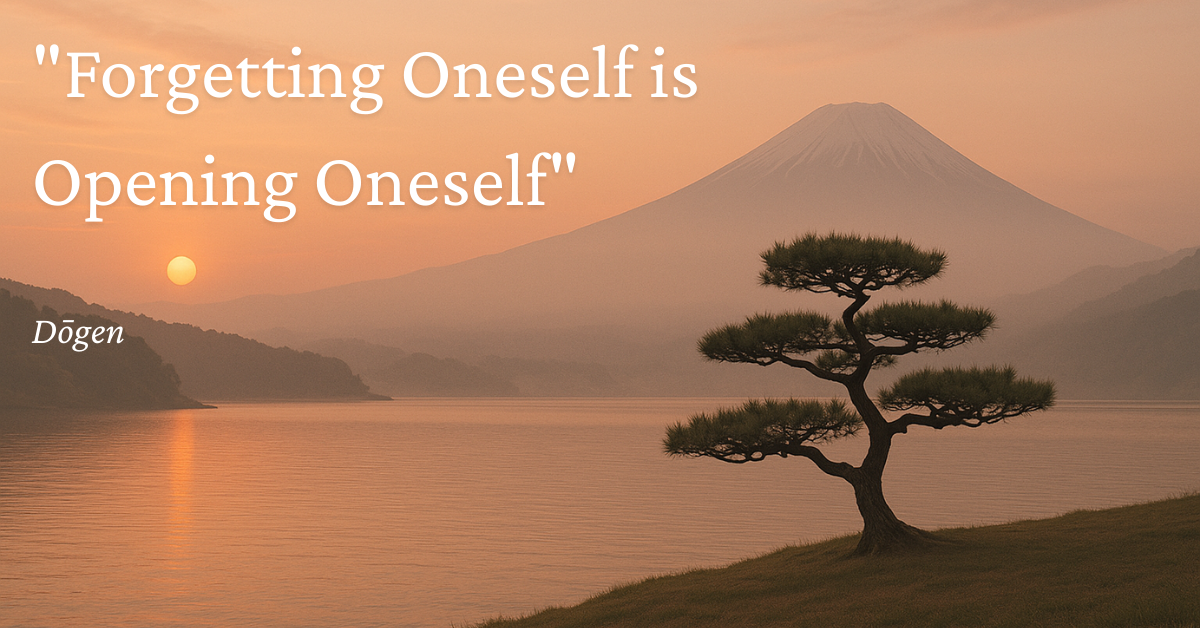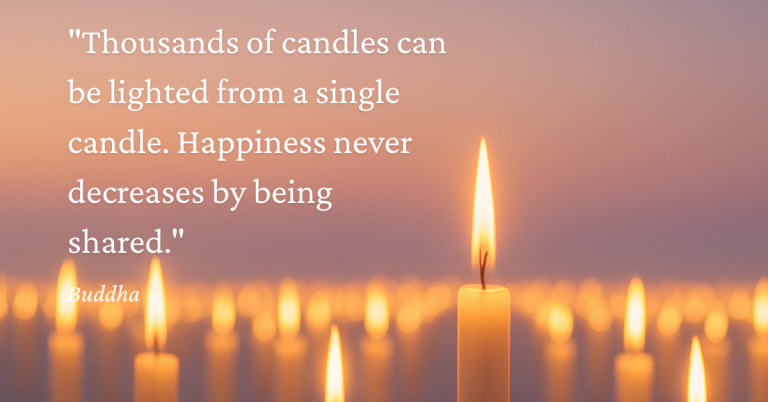A quote by Dōgen
Estimated reading time: 4 minutes
When we let go of our usual preoccupation with ourselves—our image, our needs, our worries—we often find something unexpected: space. Space to connect, to feel, to truly experience the world around us. In this brief but powerful quote, Dōgen invites us to step outside the tight frame of self-focus. Not to disappear or deny who we are, but to loosen the grip just enough so that something more honest, more alive, can emerge. It’s a call to openness—not by doing more, but by softening the constant commentary of “me.”
What Does This Quote Mean?
Dōgen’s words ask us to examine the subtle ways we stay wrapped up in ourselves. “Forgetting oneself” doesn’t mean abandoning responsibilities or losing your sense of identity. It’s about stepping back from the mental habit of filtering everything through the lens of “How does this affect me?” That filter can be exhausting—and often narrows our view of the world.
When we release that focus, even momentarily, a quiet shift can happen. We listen better. We see more clearly. We stop measuring experiences by how they reflect on us. It’s in these moments that we feel more connected—to others, to nature, and even to ourselves in a more grounded way.
This way of being is at the heart of Zen practice: not pushing the self away, but noticing how often it takes centre stage, and gently moving it aside. From that space, empathy deepens. Creativity flows. Peace arises—not because everything is perfect, but because we’re no longer caught up in constant self-evaluation.
In forgetting ourselves, we don’t disappear—we open. We meet life as it is, rather than how we think it should be. That, Dōgen suggests, is where true presence begins.
How Can You Use This Quote in Life?
1. Give someone your full attention
Next time you’re in conversation, resist the urge to rehearse your reply or mentally compare experiences. Just listen. Let your own thoughts fade a little. You might be surprised by how deeply heard the other person feels—and how connected you become in return.
2. Be fully present in simple tasks
Washing dishes. Folding laundry. Walking the dog. These ordinary moments can become more peaceful when we’re not rushing to finish or wondering what’s next. Forget yourself briefly, and let the task be enough.
3. Notice when self-talk takes over
We all have an inner critic. The trick is recognising when it’s running the show. If you catch yourself spiralling after a mistake, pause. Let go of the judgement. Shift your focus outward—what can you do next? How can you move forward?
4. Spend quiet time in nature
Go outside without a goal. Leave your phone behind. Watch the sky. Listen to birds. Let yourself dissolve into the scene, even if just for a few minutes. Nature offers a gentle reminder that not everything revolves around us—and that’s freeing.
5. Help without needing credit
Offer support because it’s needed, not because it boosts your image. Whether it’s helping a neighbour or pitching in at work, choose service over self-congratulation. The act itself becomes more meaningful when it’s not about you.
The Motivation Message
There’s a kind of lightness that comes from letting go of ourselves—of our constant need to control, impress, or evaluate. Dōgen’s quote points toward this freedom. When we stop staring at our own reflection in every situation, we begin to see more clearly what’s really there. This doesn’t mean vanishing or becoming passive. It means meeting life more directly—without the endless filters of ego. And from that openness, something beautiful grows: compassion, clarity, presence. In forgetting ourselves, we remember what it means to truly live.
About Dōgen
Dōgen was born in 1200 and died in 1253, and is remembered as a Japanese Zen master who founded the Soto school of Zen in Japan. His teachings, including the influential text Shōbōgenzō, emphasise direct experience, mindfulness in everyday activity, and the emptiness of self. He taught that enlightenment isn’t something to chase, but something to be lived—here, now, in the ordinary moments of daily life. “Forgetting oneself is opening oneself” reflects his belief that when we let go of self-attachment, we uncover something more spacious, connected, and real.




